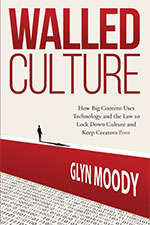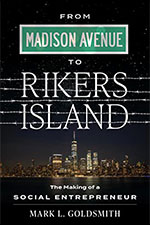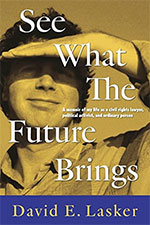
VERDICT: It’s a Keeper
Walled Culture: How Big Content Uses Technology and the Law to Lock Down Culture and Keep Creators Poor
By Glyn Moody (Antwerp, Belgium: BTF Press, 2022). 296 pgs. $7.99. Order, www.amazon.com.
Reviewed by Jean C. Baker
Current U.S. copyright laws weren’t designed and aren’t a comfortable fit for the quickly changing digital world. Glyn Moody, a technology blogger and journalist who has been writing about copyright and the internet for decades, has written this book to show “what happens when one aspect of the analogue past – copyright – resists and fights against the digital future, as represented by the Internet.”
Moody has a viewpoint, and it’s not subtle. The subtitles to the book title and to several chapters tell readers where he’s coming from: “How big content uses technology and the law to lock down culture and keep creators poor,” “Big content’s plan to take total control online,” and “Relentless lobbying plus regulatory capture leave artists and the public powerless” are a few examples. The book seeks to demonstrate how the content-consuming public is disadvantaged by copyright law, and Moody’s case is persuasive. For example, Moody discusses copyright issues involved with digital books that people buy for Kindles or check out at the library. It turns out that readers (and libraries) don’t own what we think we own. Cue ominous music!
A very valuable part of this book is the exhaustive description of the development of copyright laws proposed to address quickly changing digital advances and the problems, many unexpected, that these laws have engendered. For example, Moody discusses the Audio Home Recording Act, passed in 1992; this discussion brought a lot of memories of recording television shows and movies on big, black VHS tapes and the thrill of being unchained to a television schedule. Moody covers many of the more modern copyright law adaptations, including various iterations of the Digital Millennium Copyright Act, and brings readers up to speed about the successes and defeats of projects designed to use digital media to preserve artistic heritage, such as Project Guttenberg and Google Books.
Want to Review a Book?
Please request a book and writing guidelines from the Wisconsin Lawyer managing editor at wislawmag@wisbar.org. Reviewers may keep the book reviewed. Reviews of about 500 words are due within 45 days of receiving the book. Reviews are published, space permitting, in the order received and may be edited for length and clarity.
What’s the big problem with current copyright protection? Moody gives many examples of ownership and accessibility confusion that can happen with digital media and, in his opinion, negatively affect consumers. He discusses problems of consumer access to “orphan works” (a term to describe works under copyright protection but with unclear ownership) and out-of-print books, both of which could be easily reprinted digitally but for resistance from hard-copy publishers.
Did this book convince me? Clearly, consumers don’t have the lobbying voice that publishers and other content controllers have, but I’m not totally on Moody’s side yet. In my opinion, this book would be strengthened with a bit more perspective. Are book publishers making a financial killing these days? I think they have their own protection problems, a discussion of which would serve as a balancing force to Moody’s argument and illuminate the entire scope of the issues.
It’s an entertaining book, however, and it’s full of spicy commentary and relevant, current examples. I found many items to engage both my interest and my outrage. You won’t think of your Kindle subscription in the same way after you read this book!
Jeannie Baker, U.W. 1990, is a retired intellectual property attorney and an avid consumer of both digital and analogue media, often at the same time.
 VERDICT: It’s a Keeper
VERDICT: It’s a Keeper
From Madison Avenue to Rikers Island: The Making of a Social Entrepreneur
By Mark L. Goldsmith (Charleston, SC: Advantage, 2021). 146 pgs. $24.95. Order, www.amazon.com.
Reviewed by Dianne Post
Mark Goldsmith, a very successful marketing executive, created his own agency, which he eventually sold to retire. “Retire” means find something equally fun and rewarding to do. At the encouragement of his wife, Goldsmith participated in a program in which successful people spoke at high schools in low-income areas. He asked for the toughest high school and ended up on Rikers Island – the jail high school.
That led to Goldsmith’s 16-year career working with those boys to become successful men. Along the way, he learned as much as he taught, found that many of the boys had the requisite skills and helped put them to different uses, and gained a profound respect for their struggles. He had the personality not to talk down to them and so even though he wore a suit, he could communicate.
The book outlines what Goldsmith did and how he did it: the bureaucratic and financial struggles, the legal and personnel challenges (and successes), and the sustainability of the work. Having a son who is a lawyer didn’t hurt. Goldsmith learned that his business skills were transferrable to the nonprofit sector, just as our legal skills are transferrable.
I disagreed with some of the descriptions of corporate life and laughed at Goldsmith’s comments about women whom he couldn’t work with because they were tougher, gave him less respect, and had more complex issues. On the next page of the book, he asked, “Can you imagine growing up without consistent support from your family and friends? These guys didn’t receive suggestions or guidance regarding their future, hopes, and dreams until they came to GOSO [Getting Out and Staying Out program].” Few women grow up with consistent support from family and friends, and the suggestion for my future, as for many women then and now, was to put away all our silly hopes and dreams, get married, and have babies. Fortunately, many of us disagreed.
The book reprints letters from the program participants, many of them now very successful. Goldsmith found that education, employment, and emotional support were the most useful tools. The majority of the boys at Rikers had mental health issues because jails and prisons have become our national repositories for people with mental health problems.
Recent research shows that the most prolific and productive time of people’s lives is from 60 to 70 years old and the second most productive is from 70 to 80 years old. Many lawyers make much of their act 2 or act 3. Goldsmith is certainly an example of that as he retired from this second act in his early 80s. This is an uplifting and inspiring book to get you cracking.
Dianne Post, U.W. 1979, spent 18 years doing family law and then transitioned into international human rights law.
 VERDICT: Touchdown!
VERDICT: Touchdown!
See What the Future Brings
By David E. Lasker (Lake Delton, WI: 2022). 240 pgs. $14.54. Order, www.amazon.com.
Reviewed by John Becker
David Lasker is a Wisconsin lawyer who has led an incredibly interesting life. He is the son of a federal judge from New York. As a child he met Harry Truman, and, when in college, he met with Senator Robert Kennedy to lobby for a proposal to have students receive college credits for time spent in classrooms as teachers’ assistants.
After completing law school at the University of Wisconsin, Lasker remained in the Madison area to practice law. He handled many types of cases but predominantly civil rights cases. In that practice he suffered his share of losses, which goes with the nature of that practice. He also won his share. And he was proud of the fact that he often represented people despite the difficulty of their cases.
Lasker was involved in politics and got to know many of the influential politicians in his time. He was the chief of staff for Patrick Lucey’s vice-presidential campaign when Lucey ran as John Anderson’s running mate in 1980 for the National Unity Party.
Lasker comes from a wealthy family that had some roots in Texas. A great aunt donated money to build a skating rink in Central Park that, until recently, was named the Lasker Skating Rink. A great uncle, Albert Lasker, was principal owner of the Chicago Cubs in 1916. Lasker did not inherit his great aunts’ and uncles’ money. Although not any type of celebrity, David Lasker tells the story of an interesting life, and he discusses both his ups and downs.
What his story shows is that any attorney (or anybody for that matter), can make a difference by being involved. It might not seem like it at the time, but just trying does eventually make a difference. Party politics has intentionally not been mentioned here (although Pat Lucey was a Democratic governor of Wisconsin, and John Anderson was a Republican from Illinois). What matters are Lasker’s dedication to his beliefs and his willingness to get involved to try to have a positive effect on society.
“Successful is the person who has lived well, laughed often, and loved much, who has gained the respect of children, who leaves the world better than they found it, … who never fails to look for the best in others or give the best of themselves.” (Author unknown). From this standpoint, David Lasker has lived a very successful life.
John Becker, U.W. 1982, is a principal at Becker French & Durkin in Racine.
» Cite this article: 96 Wis. Law. 48-49 (June 2023).
